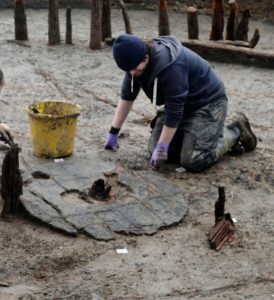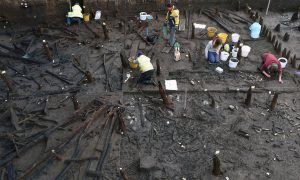Excavations at the Must Farm, on the outskirts of Peterborough (East England) led to a discovery of largest and most perfectly preserved bronze age wheel ever discovered in the UK. The artefact is made of oak planks and is dated back to 3000 years ago. The site in Cambridgeshire has been dubbed a Fenland Pompeii.

The site was first revealed by the deep pits dug for a brick clay quarry. Archaeologists are carefully excavating the wheel, which was found still attached to its hub and scorched by fire that destroyed the settlement built on stilts over a tributary of the river Nene. Due to the fire 3000 years ago, the roundhouses collapsed into the river with all their contents. The site was abandoned and gradually buried deep below the present ground level.

Wet silty clay preserved all the roof and floor timbers, the woven willow wall panels and sedge thatch eerily well preserved, along with the the bones of the animals they were eating, remains of the last meals carbonised in their cooking pots, textiles, jewellery, benches, boxes and wooden platters, knives, spears and other tools and weapons. A neat round hole punched through the wheel was left by a 20th century geologist who inadvertently bored straight through it but could have had no idea of the significance of the timber fragments in his soil sample.
(after The Guardian)